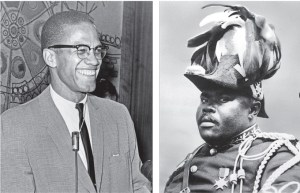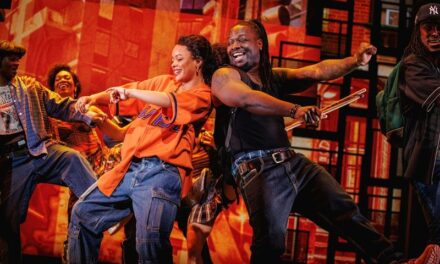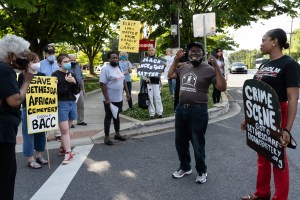
By Aswad Walker,
Defender Network
For some, holidays are just days off work. For others, many of them are considered sacred and holy. But all holidays were created by a specific group of people for a specific reason.
Holidays were meant to be vehicles for teaching, highlighting and passing down specific values important to the life and well-being of a people. A holiday is an annual event that makes sure the group that created it never forgets the value that day (week, month, season) represents.
And sure, folk who aren’t members of the group who created the holiday can take part in the festivities, and even celebrate and adopt the value it highlights. But make no mistake, holidays are group-specific– no matter how much they have become part of the lives of others.
For example, St. Patrick’s Day was originally celebrated in Ireland as a cultural and religious celebration with religious services and feasts in honor of St. Patrick, and what he represents—the arrival of Christianity to that people. When Irish immigrants brought their special day with them to America, it was eventually observed by anyone who chose to. The Day of the Dead (Días de los Muertos) goes back to the Aztecs, who dedicated an entire month to honoring their ancestors. Halloween, a day some assume was taken from the Day of the Dead, actually traces its roots to the ancient Celtic festival of Samhain, a pagan religious celebration to welcome the harvest at the end of summer, when people would light bonfires and wear costumes to ward off ghosts. Like I said, holidays are group-specific.
The problem is, if that’s true, where are the holidays created by and for Black folk? What holidays celebrate values important to us? And sure, there are values passed down via the existing holidays that we take advantage of. But for us to truly be healthy as a people, we need to create our own holidays and/or use existing ones in ways that hammer home specific values and principles that represent us and our culture.
Memorial Day
Value(s): Service to Community, Ancestor Veneration
Y’all already know Black founded the first Memorial Day, and did so in honor of Black soldiers who gave their lives to free enslaved Black people and win the Civil War. That kind of focus makes Memorial Day more than just a day banks are closed or an opportunity to picnic or hold a cookout. A value-focused Memorial Day would find tangible and symbolic ways to honor the myriad of souls who lived and died in service to our people over the eons. And to extend our memorial to include victims of generations of state-sanctioned violence against our communities (i.e. Tamir Rice, Freddie Gray, Rekia Boyd, Breonna Taylor, etc.) would be more than on point.
MLK Day
Value(s): Service, Fighting Injustice, Commitment
Y’all, MLK Day has to be about more than two dueling parades and barbecues. And it feels like folk are moving to make it more, and that’s a good thing. If we focus on the values most evident in MLK’s life, we might move away from the erroneous idea that he lived his life assured that his efforts would not be in vain. No. MLK made choices to serve and fight with no guarantee of victory. Thinking that, teaching that does a disservice to him and the courage and commitment he had to muster to honor God’s call on his life.
It also takes us off the hook to make those tough decisions about the way we live our lives and the commitment we either give or don’t to those things we say are important to us. Why? Because we put MLK (and others) on an unreachable pedestal, and convince ourselves there’s no way we could have that kind of impact and influence on the world because we’re not him. But he was human, like us. He had challenges and doubts and failures, like us. But he pushed through; like we all can do… especially if we regularly spotlight those values central to MLK’s faith walk. MLK was all about service, fighting injustice, honoring God’s call on his life, commitment and perseverance.
If we make those the focus of his holiday, we’d be moved to make it an entire weekend or a week of activities that push participants to exhibit those same values. That would be light years better for us as a people than taking the day off work and/or merely making up different, corny “dream-related” themes for our MLK festivities (i.e. When Will the Dream Be Realized; Sharing MLK’s Dream; Making the Dream a Reality; Negro, Wake Up From that Dream; etc.). In fact, MLK shouldn’t be a day off, but a day on– a day on the job of fighting injustice and creating the kind of society and world our children deserve. And that would be a good thing. Because whatever we organize in MLK’s honor would be about us giving service, fighting injustice, honoring God’s call on our lives and giving real commitment to a goal.
African Liberation Day (Pan-African Cultural Festival)
Value(s): Unity / I am because we are, Vision
On May 24, 1963, during the formation of the Organization of African Unity summit, where 32 African Heads of State were in attendance, Kwame Nkrumah stated, “We all want a united Africa, united not only in our concept of what unity connotes, but united in our common desire to move forward together in dealing with all the problems that can best be solved only on a continental basis.” With this goal in mind, Africa Liberation Day is celebrated by various countries on the African continent, Europe, the Caribbean, Asia, and the United States, annually on May 25.
It reflects our history, honors our ancestors and celebrates our victories of moving towards a liberated Africa from slavery, colonialism, neo-colonialism, and imperialism. Initially declared “Africa Freedom Day” on April 15, 1958 after Kwame Nkrumah held the First Conference of Independent States in Accra, Ghana, it was moved to May, 25 in 1965 by Emperor Haile Selassie, utilizing the day the historic charter of the Organization of African Unity as Africa Liberation Day. Today this commemoration of freedom from foreign control and unity for all of Africa’s people is still going strong as there is much more work to be done for the liberation of our people throughout the world. We need to hype this one up way more than it already is, and extend the celebration to all four corners of the world.
Kwanzaa
Value(s): The Seven Kwanzaa Principles (The Nguzo Saba)
Dr. Maulana Karenga literally created Kwanzaa for the purpose of getting Blackfolk to celebrate and incorporate proven ancient African values—seven of them: Umoja (Unity), Kujichagulia (Self-Determination), Ujima (Collective Work and Responsibility), Ujamaa (Cooperative Economics), Nia (Purpose), Kuumba(Creativity) and Imani (Faith). As a people, we just need to collectively use Kwanzaa for the purposes its intended for. Some groups and organizations have taken it upon themselves to put those Kwanzaa principles into action year-round.
He courageously spoke out against the tactic of non-violence, and instead told Black people to do what Black parents have been telling Black children forever: be courteous and respectful to everyone, but if anyone puts their hands on you or your loved ones, make sure they never think about doing it again. It would be an insult to Brother Malcolm for us to wait for the government to “authorize” a holiday in his honor. It would be more fitting if we exercised some self-determination and declared May 19 (the day of Malcolm’s birth) as an official holiday for us.
Black August
Value(s): Honoring the Humanity of All
Black August is a growing phenomenon originally created to spotlight the self-determination struggles of Black incarcerated freedom fighters. It has expanded to be much more. And emphasizing the value of honoring the humanity of all opens the door for this annual commemoration (not celebration) to grow even more, and for the treatment of the incarcerated to improve.
Black History Month
Value(s): Life-Long Learning, Ancestor Veneration, Service
By making Black History Month about living the values of life-long learning, ancestor veneration and service, just by doing that we’ve moved it away from what it has been for far too many K-12 children for far too long—a few days in February when they do a trite, surface review of what MLK, Rosa Parks and Malcolm X were about (the only three they review every year). That hasn’t worked. That has been ineffective and downright criminal. The value of life-long learning would push both teachers and students, parents and children to go deeper than the fact that MLK had a dream.
It would push them also to go beyond MLK; beyond the men of the civil rights movement (there were sisters, without whom there would have been no civil rights movement); and beyond our history within the confines of America. By making ancestor veneration a key value of this month, we are moved to find out who those game-changing ancestors were (those in the history books and those in our own families).
By making service a foundational value, we spotlight both the contributions made to “our story” over the centuries, but we also confront the roadblocks and setbacks that folk had to face and overcome. Doing that, makes our history, and the people who made it, more real and more relatable. And the service focus reminds some and teaches others that we are “making history” daily—the kind that folk will celebrate for generations to come because of our good works, or the kind folk will point to as what NOT to do because of our cowardice and inaction.
Black Women’s History Month
Value(s): Creativity, Perseverance, Unconditional Love, Courage, etc.
Though it is slowly picking up traction, Black Women’s History Month is already celebrated in April. The time spent focusing on the values Black women have displayed over time gives our community an annual shot of adrenaline and hope to face and overcome whatever obstacles come our way.
Black women are the mothers of the universe–literally. And to start giving reasons why a special holiday should be created just for them would be an impossible task. There are not enough words to do Black women justice for all they have given and continue to give towards the betterment of our people and our world.

(Photo Credit: Diversity.fnal.gov)
Juneteenth
Value(s): Self-Determination, Resistance
University of Houston history professor Dr. Gerald Horne has a book that should be the centerpiece of all Juneteenth celebrations, parades, activities, speeches, etc. going forward. The book, “The Counter-Revolution of 1836: Texas Slavery & Jim Crow and the Roots of American Fascism,” provides documented evidence that Juneteenth is actually a celebration of predominantly Black soldiers literally going to war with Texas and Louisiana plantation owners to secure our freedom after General Granger read off that famous order and owners of the enslaved refused to let their “property” go. Horne tells the story of what he calls a second Juneteenth of equal significance. But suffice it to say, both deal with Black people exhibiting courage and fighting for our freedom. Juneteenth celebrations with that kind of focus would have us identifying injustices to which we are called today to free ourselves and our people from.
The Black holidays we need
Malcolm X Day
Value(s): Self-Determination, Preaching Truth, Personal Development
I’m realizing that one value central to all of these Black holidays is courage. Brother Malcolm (El Hajj Malik el Shabazz) courageously preached truth to power. He courageously faced his own demons and emerged a changed man. He courageously committed himself to a life of personal growth and development. He courageously stood against and called out Black leaders who he believed were short-changing Black people.
Radical self care/Black joy month
Value(s): Valuing Self, Mind/Body/Spirit Care
We need to prioritize Black self-care and Black healing and Black joy. We’ve been conditioned to push all those things to the bottom of our Things To Do List, caring for everybody… but ourselves. But as the late, great Audre Lorde said, “Caring for myself is not self-indulgence, it is self-preservation and that is an act of political warfare.” The so-called “powers that be” want us beat up, broken down and dispirited. And many of us have been conditioned to believe that we don’t deserve healing, joy and the best that life and the world has to offer. Bump that. But, as long as we are striving to answer God’s call on our lives, we deserve all that the Creator has ordained for us, and all that we are willing to work and organize and invest and build and fight for. And that includes mind/body/spirit health. We deserve joy.
One God day
Value(s): Tolerance
A wise man once said, as Black people, we could practice darn near any faith tradition we choose and be confident in knowing that our ancestors practiced that same tradition. That’s a gracious way of saying just about all the world’s major religious traditions trace their roots back to Africa. So, if we gave the world numerous spiritual practices, why not celebrate that fact with an annual One God Known By Many Names commemoration? Doing so would go a long way in building tolerance and appreciation for those who worship in ways different than our own. Building such tolerance and appreciation could go a long way towards tearing down other walls that foolishly divide us so we can work together for the good of our people and this planet, and stop trippin’ on labels.
Marcus Garvey Day
Value(s): Courage, Self-Determination, Pan-Africanism

What we said about Brother Malcolm, we could say about the Honorable Marcus Mosiah Garvey. And more. Garvey created the largest Pan-African movement in the history of the world, and was so effective at “stirring up the people” that the western world’s biggest powers had to collaborate and conspire to attempt to destroy the man and the movement. But even after the US deported Garvey on bogus charges, he continued to lead the movement for “Africa for the Africans at home and abroad.” Garvey is arguably the greatest race leader Blackfolk have ever had, yet he is still one of the least known. The day of his birth, August 17, should be claimed by us as a national Black (Pan-African holiday) to teach and learn about Garvey and all he stood for.
Aswad Walker is originally from Cincinnati. He is a husband and father to six children. Walker currently serves as associate pastor for the Shrine of Black Madonna (Houston) and as an adjunct professor for the University of Houston.
This post was originally published by the Defender Network.
The post Op-ed: why Black folk need holidays appeared first on AFRO American Newspapers .











